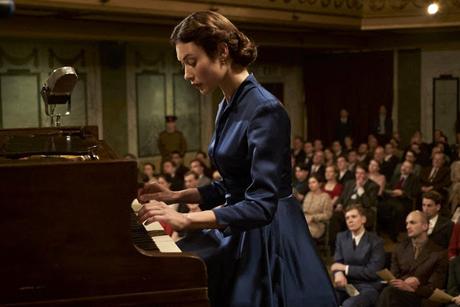by Paul J. Pelkonen

A civilizing force: Olga Kurylenko as Maria Yudina in The Death of Stalin.
The most dangerous dictator in Russian history was Josef Stalin. And unfortunately for the composers, artists and musicians who lived in the Soviet Union up until 1953, Stalin loved music. His untimely but welcome demise is the subject of the hilarious new film The Death of Stalin by director Armando Ianucci. This review is not going to focus on the film itself, which is a startling, smart and well-written black comedy. But this isn't a conventional movie review: this is Superconductor. And we're going to talk about Comrade Stalin and the music in the movie.The Death of Stalin opens with Mozart, specifically a concert performance of the Mozart Piano Concerto No. 23 being broadcast. Maria Yudina (played by Olga Kurylenko) is at the keyboard, with a small chamber orchestra in a Moscow concert hall. Stalin is listening from his dacha outside Moscow. The concert is thrown into turmoil when the dictator demands to have a recording of the performance delivered as soon as possible.
None was made.
Absolute chaos ensues. The harried broadcast producer (Paddy Considine) has to beg the musicians and bribe Ms. Yudina (known to have been old Joe's favorite pianist) to stay and play. Ms. Yudina, who can be heard on excellent recordings of the Goldberg Variations and Diabelli Variations as part of the Great Pianists of the 20th Century mega box-set is a singular artist. And Ms. Kurylenko, who starred opposite Daniel Craig in the James Bond film Quantum of Solace really learned how to play the piano as a young girl growing up in the Ukraine. (Her fingering at the keyboard is utterly convincing.)
The Mozart concerto accompanies a montage of Soviet citizens being rousted out of their beds and hustled off to be shot or exiled a common occurence in these turbulent years after World War II. An elderly man says goodbye to his weeping wife. Much to his shock, he is brought to the studio as a replacement conductor for the maestro who has already gone home. Wide-eyed peasants are brought in off the streets to sit and listen to Mozart repetition replacing members of the audience who had also gone home. Their bodies will make the acoustic of the recording right for Stalin's supposedly infallible ears.
Whatever Stalin wanted, Stalin got.
This opening sequence is based on a real incident that happened in 1944, not 1953. It represents the tip of the iceberg that was Stalin's effect on Russian music. The story of how he was displeased by the popular Shostakovich opera Lady Macbeth of the Mtsensk District is well known (and has been told elsewhere). The movie goes on to chronicle how Stalin dropped from a stroke, and about the sheer sense of comic panic that ensues as Khrushchev (Steve Buscemi) Malakov (Jeffery Tambor) and Beria ( Simon Russell Beale) grapple for power. It treats the ugly transfer of power as a frantic comedy, laughing and weeping at once much as Shostakovich's music does.
The music for the rest of the film sounds remarkably like Shostakovich, the same pounding rhythms, bold use of percussion and brass, and above all, the sense of false dawn, of a humanity grimacing in the light under the dictator's knee-high boot. Christopher Willis' score alludes to the composer's middle symphonies, the war-torn Seventh and Eighth, the sarcastic, light-footed Ninth (which got Shostakovich in trouble all over again!) and above all the Tenth, itself an audible exhalation of relief that the monster from Georgia was finally in the ground.
At the end of The Death of Stalin (this isn't a spoiler since it's all in the history books) Beria is shot dead. Everybody's glad. Malakov is still in power but soon easily replaced by the more ambitious Khruschchev. And we're back in the concert hall, watching Maria Yudina tickle the ivories again. Steve Buscemi sits there with a blank expression, absorbed in the music, exhausted from the ordeal he has been through. And waiting behind him and eyeing his seat of power, an obvious and heavy browed Leonid Brezhnev. The cycle would continue, and music would be its lone, civilizing remnant.
Watch the red band trailer for The Death of Stalin here:

